Perimenopausal complaints
Your last menstruation, after there is no bleeding for a year, is called menopause. The average age is fifty-one. The perimenopause is the period before and after the last menstruation in which your body changes and ages and needs to find a new balance in terms of (sex) hormones. See Let’s Talk Menopause | Symptoms | Education | Advocacy (letstalkmenopause.org)
Many women have few symptoms and go through those years reasonably well. Others are really suffering.
The important thing is to take good care of your own health (and others’, of course), so exercise, good weight, don’t smoke, little or no alcohol and do things that don’t stress you out.
Fortunately, there is a lot of attention for women with symptoms of that transition. But even during women’s lives, you are more likely to experience hormonal changes. Hormones are produced by the body. These have a great influence on the functioning of the body and the mind. Hormones can become disrupted due to various circumstances. The body can then react and protest. Below you can see the possible influence of hormones by age group. Fortunately, this does not apply to all of us.
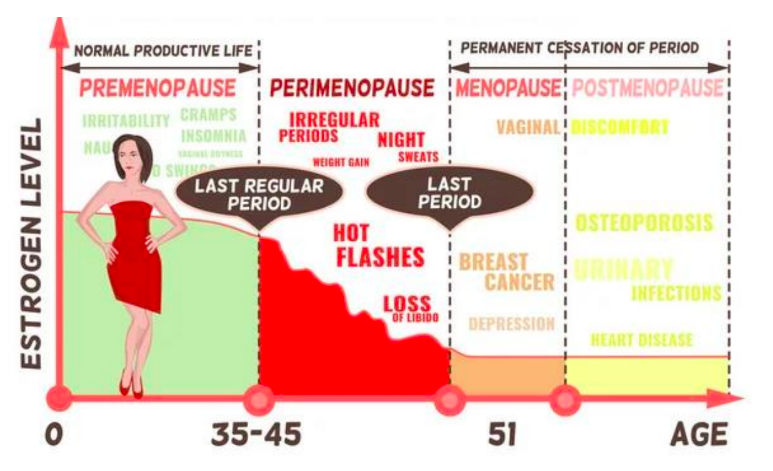
The women seen at Gynaecologie Amsterdam have been referred by their family doctor and have questions about menopause and have symptoms of menopause. Below you can see menopause in an infographic:
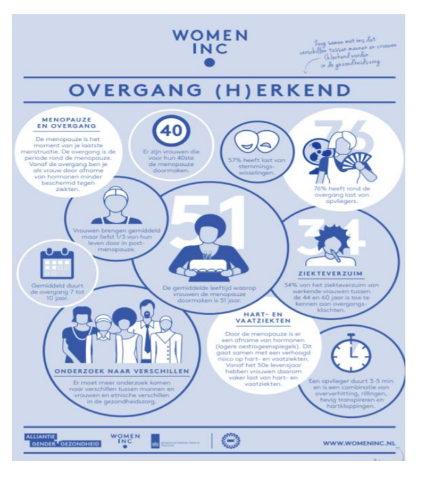
You see (then) that besides your quality of life and health, menopause symptoms can also have a major impact on your work. Fortunately, there has been some attention to this lately, so discuss your complaints in your company and with your company doctor. Sometimes small adjustments (such as flexibility in working hours and good ventilation) can be a step in the right direction.
If you look at the following picture you may get a little depressed because just about everything is attributed to menopause. However, some of the symptoms can also be attributed to unfortunately, getting older; or sometimes with burnout, or sometimes with depression.
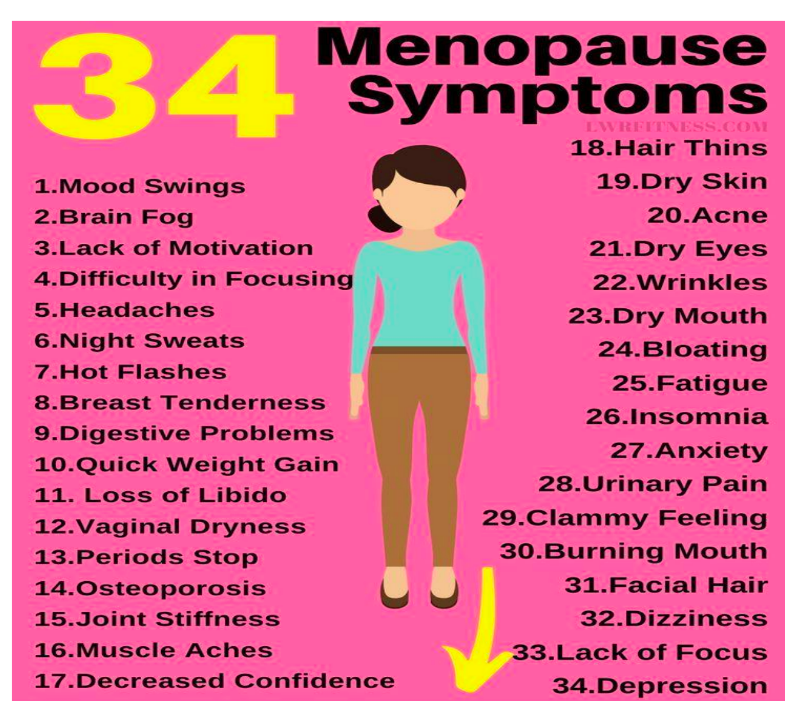
The picture is slightly stretched because, even despite your good lifestyle, you can also gain weight and lose your waistline. At Gynaecologie Amsterdam, there is a patient who keeps her wasp waist with hoola hooping, but of course there is no scientific research on that.
First we will cover some general topics and then move on to the treatment of symptoms: first, fertility, it decreases with age.
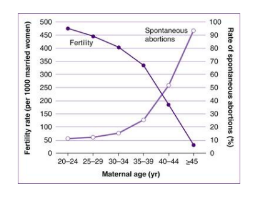
We always get a lot of questions at Gynaecologie Amsterdam about this topic.
So read through the above and remember that you are usually still fertile until menopause.
Cardiovascular disease with aging
The hormone estrogen has a beneficial effect on the heart and blood vessels. As a result, women under fifty are less at risk of cardiovascular disease (heart attack or cerebral hemorrhage) than men in the same age group. The protective effect of estrogen drops off after menopause and then, unfortunately, the risk of cardiovascular disease increases. So another reason to ensure fitness and a healthy lifestyle.
Osteoporosis (osteoporosis of bones)
After menopause, bone density decreases more rapidly because estrogen is no longer produced. Bone density can be measured and when it falls below a certain value it is called osteoporosis. Depending on your history and (family) anamnesis, a bone density measurement (DEXA scan) may be advised.
But at least after age 50, take 1 vitamin D pill a day!
The most common perimenopausal symptoms are
Concentration problems (hormone-related brain fog)
Hot flushes (hot flushes)
Night sweats
Sleeping badly
Mood swings
You can imagine that with these symptoms you function worse in your life, at work, at home. We often hear this from women at Gynecology Amsterdam. And we understand that very well because imagine if you don’t sleep for three nights the whole world is going to look different.
Below is a scoring list you can use to understand for yourself how your quality of life is now. See https://www.iph.nl/en/positive-health/what-is-it/
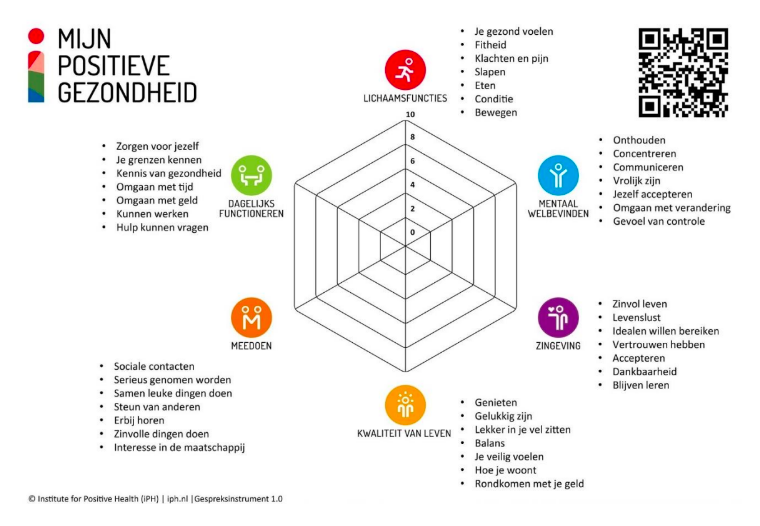
What can you do about your symptoms yourself?
This is, of course, the first thing you have discussed with your doctor or the first thing we are going to discuss with you when you come to Gynaecologie Amsterdam.
Treatment
The goal of treatment is
improving quality of life (see spider web above)
Reducing psychological and musculoskeletal complaints
Sleep!!!!
Most important:
When your symptoms are recognized and acknowledged then you can discuss them more easily and ask people to take them into account. Of course, you can also prepare yourself with the avoid stimuli where you get hot flashes, dress with cardigans and layers, bring deodorant and fan to work. Rest moments and also take care of relaxation. In terms of lifestyle, exercise (for example, yoga), watching your weight and almost no alcohol are a good start and are often sufficient.
Homeopathic treatment works for some women, but the effect is unclear because, by our scientific standards, too little research has been done.
Classical Chinese acupuncture has been studied, however, and may possibly help with hot flashes and quality of life.
Non-hormonal treatment: gabapentin
Then start in a low dosage and after 2 weeks increase the dosage. Decrease in hot flashes is 24%!
There are side effects especially in the first few weeks but they often disappear over the course of several weeks to months.
Phytoestrogens especially from soy products and isoflavones such as red clover, may do something for your hot flashes. Note if a product has estrogenic effects, it also has the disadvantages of estrogenic treatment.
Hormonal treatment
When you have a uterus, you should always combine the hormone estrogen with the hormone progestogen for at least 12 days a month.
Dosage ´as low as possible, as much as necessary´. To be determined individually through a conversation at Gynecology Amsterdam with you through shared decision making!
Treatment duration depending on symptoms, preservation of quality of life or prevention (osteoporosis).
Regular evaluation (at least once a year at the doctor’s office or with us).
Preference is given to endogenous estradiol and progesterone or dydrogesterone because of its favorable side effect profile, (weaker and more selective action than other progestogens).
Side effects
Fortunately, the side effects of hormone therapy for menopause symptoms have also received a lot of attention
Below is some information from our professional association that will, of course, be discussed with you.
The risks of Hormone Therapy for breast cancer depending on the type of hormones but also compared to the risk of breast cancer with obesity. This will also be discussed with you.
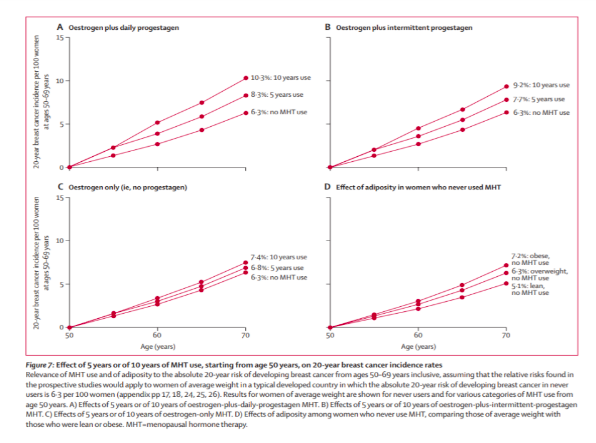
In addition, the risk for thrombosis will also be reviewed with you.
And perhaps most importantly for you!
Sex and the menopause
Most households have 8 cookbooks in the house. Sex books (not porn books or porn sites) are lacking in most households. “Sex lifelong learning” is a suggestion for a good and informative book.
Sex is a form of intimacy and essential for many people and contributes to a better relationship, self-image and feeling happier. So don’t manage that sex in that transition, do something about it. Talk about it with others, your partner, girlfriends or friends, GP, sexologist or at Gynaecologie Amsterdam.
No desire, pain during sex or after sex are real problems. But did you feel like it before that? And if you take your time are there things you do find exciting then? Talk about it, find out with any partner in your relationship what sex means to you and yours. Possibly go to a sex therapist for further discussions, but do something about it….
And if you both don’t feel like sex anymore and you both don’t find that a lack in your relationship go do something else fun together, like biking, hiking, drawing, bird watching, etc. But make sure you don’t lose that intimacy and familiarity. Touching, hugging and human skin contact we missed so much in the Corona era and you know how important that is.
If you do feel like it, or get a few important tips: to get and stay aroused you usually need a little more time. Often, by the way, your partner needs more time, too. And sometimes you need a lubricant with sex because your mucous membranes become a little thinner and more sensitive. Sometimes you also need local hormones because your mucous membranes become too skimpy and sore.
If you want more information about lubricants, check out the Condomerie website.
If you wish, please read through this information and we will be happy to discuss these topics with you during your initial consultation at Gynecology Amsterdam.
And furthermore: dozens of books have been written lately about menopause, dozens of preparations recommended for menopause and something is written about it in every magazine. Take a look at the website of Who We Are – Women’s Guide;
And the podcast of “Practice Isa and Medina”
But above all, make your own choice. For questions/information requests or to make an appointment (after referral or private consultation) email info@gynaecologieamsterdam.nl
